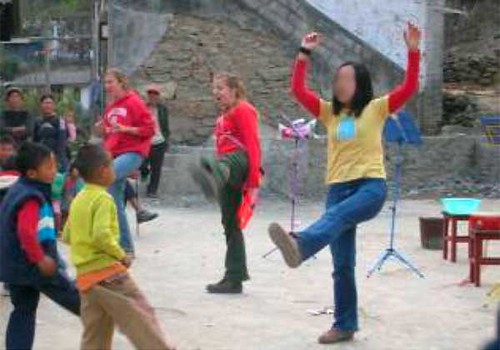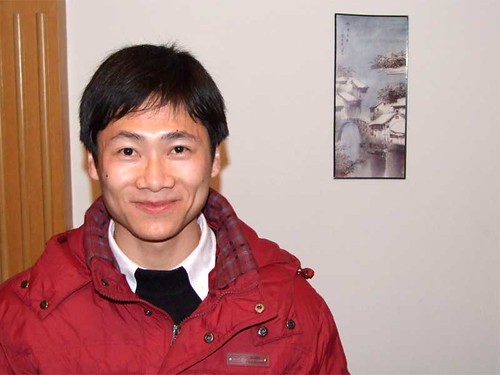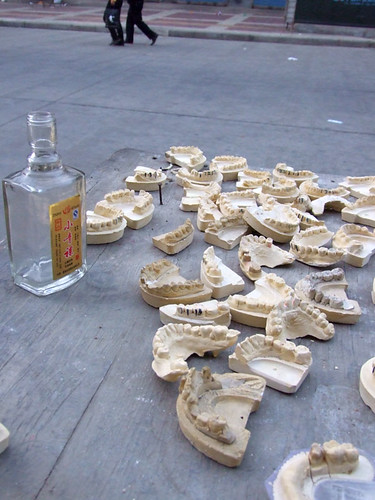|

It’s not uncommon for a foreigner to give a Chinese friend their English name. I’ve named Ben and William, for instance, and even bestowed the more outlandish names of Ringo and Clement upon kids while in Qinghai two summers ago. I gave Marie (pictured above outside Beijing’s Bell Tower) this French-sounding name, though, not on a whim but because she wants to study in Paris next year. She didn’t like the English name given her by her first English teacher in China: Mindy.
Marie is in her final undergraduate year at Beida, studying Artificial Intelligence: she was one of 18 students in approximately 170,000 in her province to score high enough on her gao kao exams to come here. She’s from southerly Yunnan province, and her roots show in her accent while speaking Chinese. When speaking English she also mixes her ‘l’s with her ‘n’s, which I have never heard another Chinese friend do (‘l’ usually gets confused with ‘r’, thus the undying hilarity of asking for flied lice).
Of course, I’m in position to pass judgment on poor pronunciation. I get the tone of ‘sentence’ wrong, and ask if my tangerine was correct, more often than is polite.
Marie also sexy-jazz dances. Check out this clip to see what that is. She took classes for half a year though, in the the interest of accuracy, she’s now moved on to ‘new jazz’ dancing. When we discuss music, Marie is quick to whip out her MP3 and we listen to Britney Spears (she loves the new song ‘Womanizer’), Avril Lavigne (‘Girlfriend’) and especially the Pussycat Dolls (‘Freak’ is the favourite here … I felt a little awkward when asked to translate the lyrics to this one).
All this in addition to playing the zither-esque guzheng, one of China’s most ancient and traditional musical instruments.
Fingers crossed all will go well and Marie will take her guzheng-worn fingers, 1 in 10,000 exam results, A.I. know-how and sexy/new-jazz moves to Paris in July 2010 to study Physics or Maths. What is it which excites her most about the prospect of living in France, I ask?
“Disneyland.”
This is a conversation I had with William a few months ago, when I was only just getting to know him (and hadn’t started blogging about his life). I can’t remember what turned the flow of our talk in this direction, but William began telling me how lucky he considers himself – being able to work in Beijing for an environmental magazine which involves hard hours but none of the back-breaking rural labour his parents endure:
Only a few people live like me. Most people live in another side, in a factory in South East China [for example] … I don’t need to work hard like them, I read books … In 1.3 billion people, the number of people like me are very small.
I asked him if he misses the countryside he – like so many young guys and girls in China’s capital – is originally from:
William: My parents are peasants, and in my heart, I am a peasant. I have no hukou [registration document] in the city, my ID is in the countryside … I’m not a city person.
Alec: Many peasants come to the city to make more money, there is more opportunity.
William: Make money is not my aim. Having food to eat is enough.
Alec: Your aim is to make a difference?
William: Yes. There are lots of pains in China. I think I should say something [speak out] as a peasant, not a city person. I will be a peasant for my life … In China there are two people: a city person and a rural person.
Well, I think there are two kinds of young immigrants from the countryside in Beijing: those who are all too eager to cut themselves off from their roots, and those who water those roots and keep them in mind (after all, you can change your leaves but not your roots). William is one of the latter. It’s why I consider myself lucky to be his friend.
Once a week, generally after 10pm as he’s so busy working before, Ben phones home. It’s been well over half a year a year and a half now since he left his hometown in Shaanxi province to try his luck in the capital. Like most Chinese (or those who can get train tickets), he spent a week home over spring festival, but otherwise he keeps in touch with his parents through these thirty to forty minute long calls.
Ben’s Mum is a farmer, and Ben is quick to remind me that Chinese farmers are a world apart from their English counterparts. “In England, a farmer has a lot of land which they own. In China, they only have very small land to farm.”* (And, of course, Chinese farmers don’t own their land.) His phone conversations with his mum consist mostly of her asking if he’s wearing enough warm clothes. This, needless to say, is unlike farming in that it’s something England and China have in common (yes Mama, if you’re reading this, I’m wearing lots of sweaters).
His Dad works as a salesman for a pharmaceutical company in a town 300 kilometres away from his hometown. This means he can only afford the time and money to visit his wife at home once a month. It’s a common story across China, where fathers from the countryside seek better paid work in bigger cities, by necessity leaving their families behind. When he started this job 20 to 30 years ago, he earnt 70 or 80 kuai (£7) a month. Now he earns 3000 kuai (£300). On the phone with Ben, he is eager to ask about the little details of how his son’s business is going.
Near the end of our chat, Ben made a point of mentioning that his father, 53, can’t work forever and that he himself is keen to start supporting his parents as soon as he can. This is also unlike farming in that isn’t, I’m afraid, the first thing on the mind of a young English graduate (I know this because I am one) when he’s considering the reasons he wants to start earning money.

West of Shangri-la in southwesterly Yunnan province, a remote corner of the Tibetan plateau borders Burma. It’s comprised mostly of the Lisu and Nu minorities: who together number just thousands in China’s billion plus population. This is China at its most different to the smoggy, swotty university district of Beijing. And it’s where Mary spent her spring festival break.
She and friends spent a week moving from village to village – with such colourful names as Wawa – bringing the children medical supplies, basic hygiene lessons, and musical evenings. This was a combined effort of two non-profit organisations, MCC and HAND, but the initiative behind the trip was all Mary’s. Coming back to Beijing, though, she couldn’t help feeling sad:
I wanted to help, but felt helpless. You can bring one happy day [to the children] but then you go … It makes me appreciate my life more.
It’s needless to say this is a very poor region of China. And Mary rubbed up against it’s more pitiful side: helping children with disabilities in particular. She also described seeing three very sick elderly women, one of whom they suspected had breat cancer. But they couldn’t take her to hospital, as their medically trained consultant was already on his way to Kunming.
Coming face to face with suffering like this is something I would have imagined would test a Christian’s faith. Not Mary’s. Or those she was helping. Roughly 70% of the region’s population is Christian, thanks to the missionaries set up in the early twentieth century by the Brit James Fraser. Is this one of the reasons the area appealed to Mary? Did she find it especially rewarding to help those of the same faith as her? I’ll ask next time I can … or if you’re reading this, Mary, reply in the comments!
A final footnote is one of Mary’s comments on living with the Lisu and Nu minorities. She noticed at several points babies playing near fires while their parents didn’t intervene. This, she felt, was a result partly of poverty (wholly, in my less informed opinion) but partly a genuine difference between theirs and the Han Chinese ethnicity. “Han take care of their children.”

Cheng Liang is a friend and classmate of Matilda‘s in Beida – in his first postgraduate year studying Chinese language (which incorporates teaching Chinese as a foreign language and linguistics, among other things). He hails from the island of Chong Ming, near Shanghai (‘my island’, as he calls it).
Liang has also been studying ancient Greek since 2003. Why did he choose to take up this particular dead language? Because (why else?) “there was a beauty in the class”. He even has a Greek name, given to him by his teacher: Leonidas. On which note, here is a picture of Liang from another angle.

King Leonidas studied philosophy at Beida as an undergraduate, focusing on logic. As a result, he’s full of interesting riddles and problems. Over dinner the other day, he told me of Betrand Russell’s famous paradox, and this Greek one which is still troubling me:
A hairdresser says he will cut the hair of everyone who does not cut his own hair. Can the hairdresser cut his own hair?
Or this will happen to your teeth.
 (I took this in Gonghe, just south of Qinghai lake)
|
|






